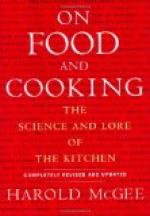COOKED FRUIT.
Perfectly ripe fruit is, as a rule, more desirable used fresh than in any other way. Fruits which are immature, require cooking. Stewing and baking are the simplest methods of preparation.
GENERAL SUGGESTIONS FOR COOKING FRUIT.—The utensils for stewing should be porcelain-lined, or granite ware. Fruit cooked in tin loses much of its delicate flavor; while if it be acid, and the tin of poor quality, there is always danger that the acid of the fruit acting upon the metal will form a poisonous compound. Cover with a china plate or granite-ware cover, never with a tin one, as the steam will condense and run down into the kettle, discoloring the contents. Use only silver knives for preparing the fruit, and silver or wooden spoons for stirring. Prepare just before cooking, if you would preserve the fruit perfect in flavor, and unimpaired by discoloration. In preparing apples, pears, and quinces for stewing, it is better to divide the fruit into halves or quarters before paring. The fruit is more easily handled, can be pared thinner and cored more quickly. Peaches, apricots, and plums, if divided and stoned before paring, can be much more easily kept whole.
Cook in a small quantity of boiling water, and if economy is a point to be considered, do not add sugar until the fruit is done. Sugar boiled with an acid will be converted into glucose, two and one half pounds of which only equal one pound of cane sugar in sweetening properties. It will require a much larger amount of sugar to sweeten fruit if added before the cooking process is completed. Fruit should be cooked by stewing, or by gentle simmering; hard boiling will destroy the fine flavor of all fruits, and especially of berries and other small fruits. Cinnamon, cloves, or other spices, should not be added, as their stronger flavors deaden or obliterate the natural flavor, which should always be preserved as perfectly as possible. If desirable to add some foreign flavor, let it be the flavor of another fruit, or the perfume of flowers. For Instance, flavor apple with lemon, pineapple, quince, or rose water.
Unripe fruit is improved by making the cooking quite lengthy, which acts in the place of the ripening process, changing the starchy matter to saccharine elements. In cooking fruit, try to preserve its natural form. The more nearly whole it is, the better it looks, and the more natural will be its flavor.
Apples are best cooked by baking. Pears and quinces are also excellent baked. The oven should be only moderately hot; if the heat is too great, they brown on the outside before they are done throughout. In cooking fruit by any method, pains should be taken to cook together such as are of the same variety, size, and degree of hardness; if it is to be cut in pieces, care should be taken to have the pieces of uniform size.
RECIPES.




